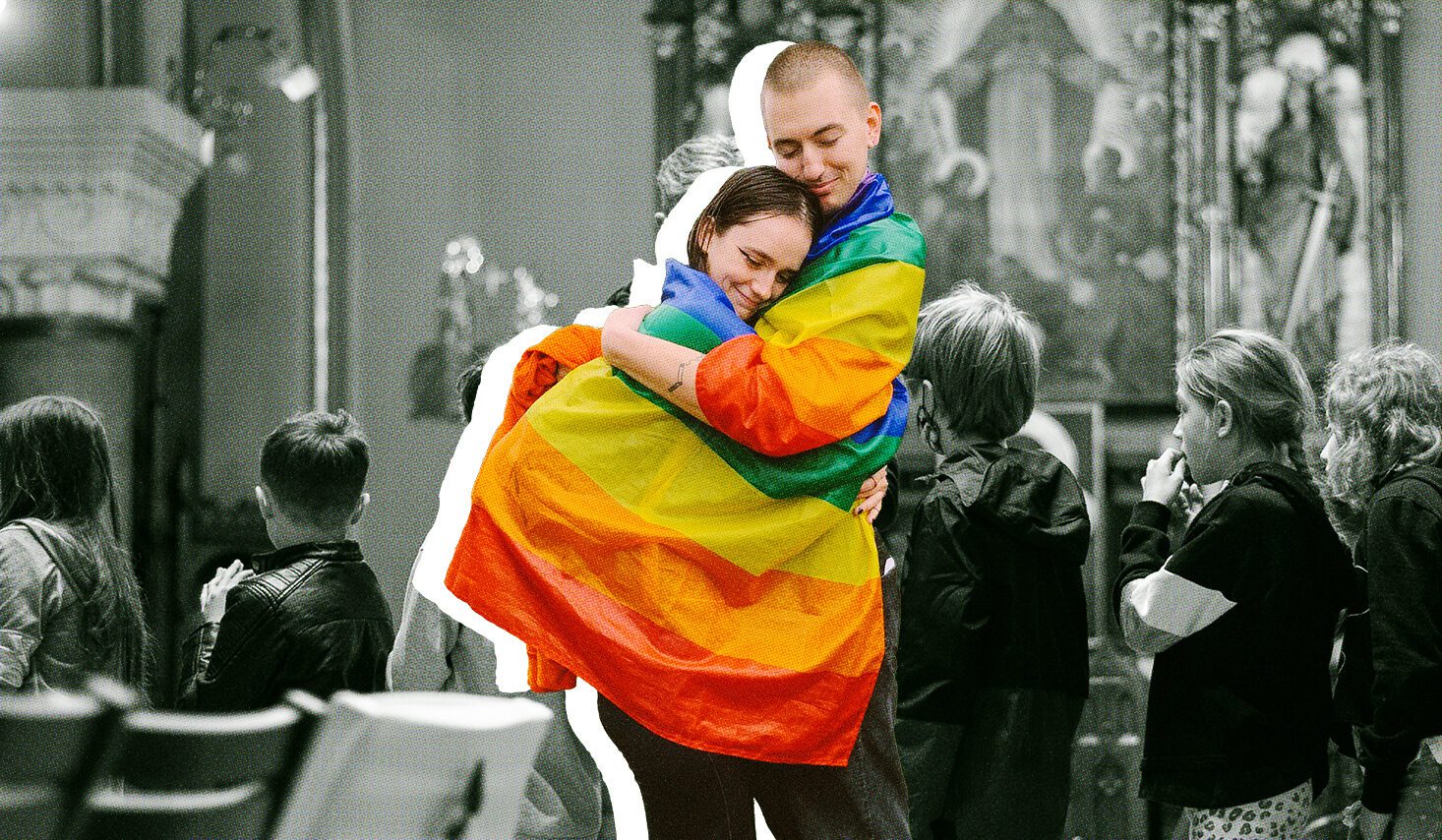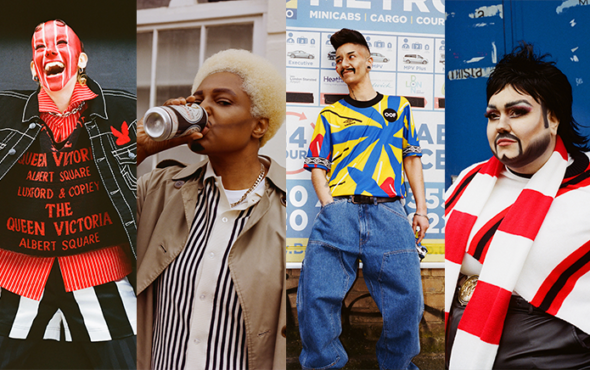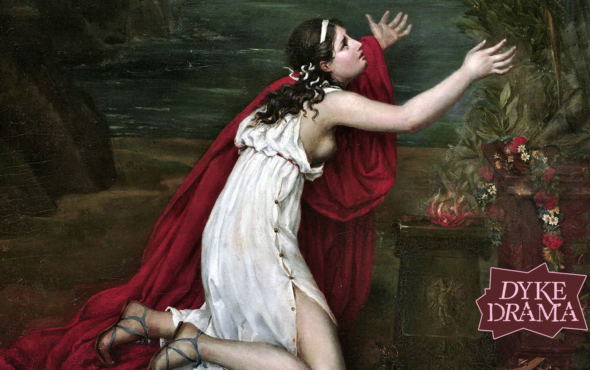
Three years ago a media storm surrounded Poland’s crackdown on LGBTQ+ culture. Now, a new generation of LGBTQ+ activists who have grown up witnessing the backlash is coming of age and changing their standing in the country’s rural southeast.
Away from the bustling metropolitan hubs of Warsaw and Krakow, there has been an ongoing battle, or persecution depending on who you ask, between the Polish state run by the prevailing Law and Justice (PiS) party and the LGBTQ+ community. It’s in the country’s southeast region of Podkarpackie, bordering Slovakia to the south and Ukraine to the east, where you’ll find the clearest friction between a society based on conservative Catholicism and LGBTQ+ identity. This part of the country encompasses both the most devoutly Roman Catholic and one of the PiS’s biggest support bases.
“You get older and you become an adult and you want to love and have sex. I was forced more and more to hide it. The years I spent in my hometown I consider to be mine but not mine, I didn’t have life on my own terms,” Leszek, 23, says. Like many other non-heterosexual or non-cis people growing up in the town of Sanok in Podkarpackie, like many others outside of Poland’s metropolitan hubs, he took away two lessons from adolescence in Poland’s rural east: how to fight and how to hide.
Now studying in the city of Katowice, Leszek has found peace away from the country and in the city where he can express himself without fear of judgement and possible violence. “We are fighting to make this life something that we can call our own.”
Young LGBTQ+ people who don’t relocate to the bigger cities of Poland leave the country altogether to find a difference in attitude and opportunity. Living in Vienna, Jacub, 22, is far away from his home in the small village of Zarszyn, a fifteen-minute drive from Sanok. As an openly gay man, he chose to leave his hometown, creating a rift between himself and his family. “I tried to kill myself because I realised, I couldn’t turn myself straight. For me, being gay was the end of the world. I didn’t imagine a world where it would be fine to be gay because the only thing I saw was how Poland reacted to gay people,” he says.
In 2019, regions, townships and other municipalities across Poland started adopting anti-LGBTQ+ declarations banning Pride marches and ‘LGBTQ+ Ideology’. One legislation introduced in Lesko, another town close to Sanok in Podkarpackie, stated it wanted to protect the community from ‘radicals striving for a cultural revolution in Poland by attacking freedom of speech, the innocence of children, the authority of the family and school’. By the summer of 2020 these ‘gay-free zones’ made up one-third of the entirety of Poland, by which time Leszek and Jacub were of age to leave their rural hometowns and head to a city outside of the region.
Mia, 21, from Lesko County, found the city of Wroclaw a place of refuge from prejudice. “I know if I went [back home] I would still have to hide my identity.” Due to social attitudes, Mia had hoped she was bisexual to reduce the likelihood of being completely out to her family and friends. Now, four years after the LGBTQ+ free zones were announced and although perhaps not drastically, the landscape has changed. “There’s some kind of activism forming now. For example, when I was younger there was no way there could have been a Pride parade.”
Facing European-wide scrutiny, many of the regions that had adopted the ‘gay-free zones’ backtracked after the threat of the European Union to withhold funding. Podkarpackie lost funding from Norway and several other organisations within the European Economic Area as a consequence of refusing to backtrack their ‘family protection’ policies.
In response to anti-LGBTQ+ legislation, protests erupted across the country in the summer of 2020, culminating in the Rainbow Protests in Warsaw decrying the adoption of the ‘gay-free zones’. This coverage, along with the growing use of social media, spotlighted Poland’s political revolt and how younger generations are actioning change. “There is a queer revolution going on right now,” Jacub says. “They [the ruling party, PiS] started harming us publicly but people got pissed off – but what happened is the opposite because they brought queerness into the public conversation.”
In June 2022, the first-ever Pride march was held in Sanok. Benek, 17, was one of the organisers of the powerful event. “I remember the rainbow strikes in Warsaw. That was the time the whole Polish queer community woke up.” Benek was raised with the stories of past generations who had to hide in the closet or be beaten in the streets for their sexuality; now, he’s seeing momentum for change pick up in unforeseen ways. “There are 14-year-olds with Pride bags in my school. This wasn’t possible when they were my age. It’s getting faster and faster now.”
The Pride march was a declaration of a new generation of Podkarpackie, something that is happening across Poland, of people who are vowing to be more open and not tolerate being hidden. It also gave the older members an opportunity to show that they too weren’t afraid of the society that they had left for the city. “It was a freeing experience to be there with my friends in Podkarpackie, not in Warsaw but there with this little group.”
Marzelina, 23, a Podkarpackie native returned for Sanok Pride from her new home in Wroclaw, along with Jacob, to see and support the history that was being made. “I wouldn’t think when I was in high school that I would be going to Pride in Sanok in four to five years. It’s crazy.”
In the southern part of the Podkarpackie region close to Sanok, the town of Lesko has been a ‘gay-free zone’ for almost four years. This April, a decision by Lesko county council about whether to keep its anti-LGBTQ+ legislation was up for a vote. Activists, both local and national, sent questions to the voting councillors stating “Poland must be free of hatred” along with a public petition to the community which picked up the attention of local media. With public outcry, upcoming elections and the threat of cutting funds from the European Union, Lesko Council reversed its homophobic policy.
“We appealed to their conscience and goodwill,” Wiktoria Baranska, 27, Secretary of the Polish Pride Alliance explains. Living in the major city of Krakow, Wiktoria is among many activists who travel across the country to organise demonstrations, conduct petitions and work with the Polish Pride Alliance, which works with representatives of the EU, and all of Poland’s Pride organisers across 32 cities.
Wiktoria sees the positives of moving forward for the next generation of queer youth. “They have a completely new mindset. They have a difficult history behind them, but they are very proud of themselves. There’s less insecurity and shame compared to people my age. Even 10 years ago it was very different and 10 years from now it will be even better.” Wiktoria returns regularly to Podkarpackie to help with the organisation of Sanok Pride, which will take place again this summer.
Although only four years have passed since the ‘gay-free zones’ appeared, the cultural landscape has changed, leaving a generational gap between those who hid in high school, to those who feel solidarity with a wider community of LGBTQ+ people. What started out as an attack on a seemingly easy target for the government has turned and brought international support, the explosion of grassroots activism and a change of national conversation.
This autumn, Benek will start university in Warsaw where he intends to join the vibrant queer scene of the capital which saw tens of thousands march through the streets during its Equality March in June. In May, activists including the Polish Pride Alliance drafted and sent an open letter to the Polish government signed by the ambassadors of several different countries including the United States and Germany, to pledge support for the LGBTQ+ community.
For Gen Z Polish queer youth, the scars of growing up in the rural east have only illustrated the pain and hurt left by their family and a society that does not want them for who they are. “[This] cycle won’t break if there isn’t someone who [will strike] first,” Marzelina says.
Within her university, she has created the first queer organisation encompassing other queer people from rural communities – including some from Ukraine as well. Something that would have been extremely difficult for her to do just five years ago is happening along with hundreds of other activist efforts throughout Poland.
Now, a little over a year after its first Equality March, Sanok will conduct another one, making this the third Pride event within the Podkarpackie region after its capital of Rzeszov and the town of Krosno. “The march aims to show LGBTQ+ visibility in smaller cities as well. Yes! This is where we are too.” The organisers of Krosno Pride posted on Facebook: “Just two years ago our neighbourhood was one of the so-called ‘LGBT Free Zones’, let’s show that we also have the right to live peacefully in smaller cities like ours.”
Although collective groups such as Sanok Equality March and other LGBTQ+ groups across the country have made large strides in social acceptance within Poland, individual legislative rights still seem to be a far way off. With national elections later this year, some pin their hopes that a change in government might be the sign that Poland is ready to move on from this dark chapter and move toward greater equality.



